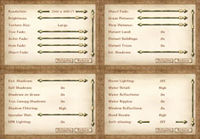The Elder Scrolls IV: Oblivion
Publisher: 2K GamesWe used the latest addition to the impressive Elder Scrolls series of titles, Elder Scrolls IV: Oblivion with the 1.2 patch applied. It uses the Gamebyro engine and features DirectX 9.0 shaders, the Havok physics engine and Bethesda use SpeedTree for rendering the trees.
The world is made up of trees, stunning landscapes, lush grass and features High Dynamic Range (HDR) lighting and soft shadowing. If you want to learn more about The Elder Scrolls IV: Oblivion, we recommend giving our graphics and gameplay review a read.
The graphics options are hugely comprehensive, with four screens of options available for you to tweak to your heart's content. There is also the configuration file too, but we've kept things as simple as possible by leaving that in its out of the box state. For our testing, we used a two minute section walking through a wooded area, down into a valley. This test scenario features lots of vegetation and trees, and is one of the most intense sections we've found in the game -- especially when anti-aliasing is enabled at the same time as HDR.
Again, similar performance, similar price. Probably the most noteworthy result is the one at 2560x1600 4xAA, where the GeForce 9800 GTX manages to eke out a slight lead over the GeForce 8800 GTX, even despite the big memory bandwidth and pixel fillrate deficits. This title obviously has more to gain from higher shader clocks at higher resolutions and that's proven by the big gap that shows up when you turn AA off at the same resolution.

MSI MPG Velox 100R Chassis Review
October 14 2021 | 15:04










Want to comment? Please log in.